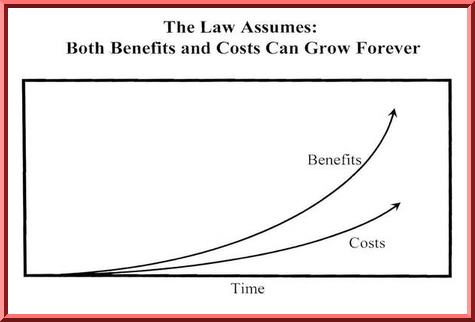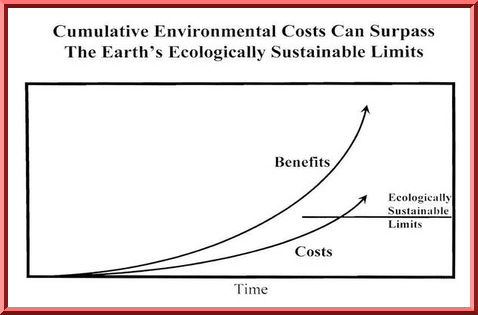LIVING ABOVE THE LINE
[Rachel's introduction: Our legal and economic systems are based on the assumption that economic growth always provides more benefits than harms. But now that we have exceeded many of Earth's ecological limits, that basic assumption no longer holds true. The implications are profound.]
By Peter Montague
I know it's not fashionable to talk about limits. Nobody likes limits. But anyone who's paying attention knows that the Earth has definite limits. It's a tiny place, really. (If the Earth were a peach, then the part of it we inhabit -- the biosphere -- would be the fuzz on the peach.)
About six months ago, the United Nations Environment Programme's fourth Global Environmental Outlook Report (GEO-4) concluded that we humans presently require 22 acres per person to support our global average lifestyle -- but, the report said, Earth has only 15 acres per person available.
In other words, we have already exceeded the Earth's "carrying capacity" -- it's capacity to "carry" (or support) 6 billion humans. And the human enterprise is poised for a massive spurt of economic and population growth -- expected to raise our numbers to 9 billion by roughly mid-century and to double the size of the human economy every 23 years.
This is why the surface of the Earth is getting warmer, chemical contamination is rife, fresh water is in short supply, and there are food riots occurring or threatening to occur in about 40 countries. Given the way we live now, there's not enough space on earth to provide land for the food and minerals we require, plus places to absorb our wastes.
The situation is serious. In 2005, when the Millennium Ecosystem Assessment was published, the directors of that authoritative study said, "At the heart of this assessment is a stark warning. Human activity is putting such strain on the natural functions of Earth that the ability of the planet's ecosystems to sustain future generations can no longer be taken for granted."
Unfortunately the U.S. legal and economic systems are premised on the idea that everything can grow without limit -- and everyone else's legal and economic systems seem to rest on similar assumptions. Attorney and scientist Joseph H. Guth** shows this in two simple graphs.
Here's the first one:

In this graph, Joe Guth shows the two basic assumptions that underpin our present legal and economic systems (and the regulatory system they have spawned). First, the system is premised on the assumption that economic growth is always good -- which is to say, the benefits will always be larger than the costs. (Joe Guth wrote about this in more detail in Rachel's #846.) Yes, the system acknowledges that people are being harmed and that the earth is being stressed by "development" -- but overall the system assumes that benefits always outweigh costs.
This is why it is almost impossible to beat polluters in court -- the legal system assumes that the polluter is creating more good than harm and it is up to you, the plaintiff, to prove otherwise. If you can prove to a near certainty that the costs of an activity outweigh the benefits, you've got a fighting chance that the judge will make the polluter pay a fine or perhaps even cut back the pollution a bit. But notice that the burden of proof rests on you to prove that the harms outweigh the benefits. If there is any real doubt or uncertainty, the polluter wins automatically (the polluter gets the benefit of the doubt).
Secondly, both the legal system and the economic system assume that costs can grow forever without limit. That's what Graph 1 shows. Neither the economic system nor the legal system recognize that the Earth is finite and that we've already run out of space to support ourselves in the style to which we have become accustomed.
In the law, there are no built-in limits -- nor even any built-in way to recognize limits or even to recognize the need for limits -- and anyone who wants to impose limits bears the burden of proving that limits are necessary and reasonable. Without compelling proof, growth proceeds unchecked. Growth gets the benefit of the doubt.
Now let's look at Graph 2.

Here we see a horizontal line that represents the ecological limits of the Earth. According to the GEO 4 report and the Millennium Ecosystem Assessment, we are already living above this line -- and so about 2 billion people have run out of necessities (water and food), not to mention housing, education, health care, and the other basics of a decent life.
You could say that the horizontal line represents the "precautionary principle." In many cases, we don't know exactly where the limits of the biosphere lie. But when we exceed them, we usually learn about it the hard way -- ocean fisheries stop producing fish, for example, or the temperature of the planet begins to rise and storms grow more frequent and more destructive, or industrial poisons begin to be measured in human babies' first poop (which is called meconium). These are all unmistakable signs that we have exceeded earth's carrying capacity (sometimes called "assimilative capacity") and that our cumulative costs have risen above the horizontal line in Joe Guth's second graph.
Some Growth is Good
Economic growth is needed in poor countries, so they can begin to live a better life. They need roads, power plants and ports. They need to achieve a middle-class lifestyle so they can afford real social security programs instead of relying on large numbers of children as their only old age insurance. (This is the answer to "the population problem" -- middle class people naturally want small families, so we need to raise everyone's standard of living so they need and want fewer children.)
But growth in the global South will require us to cut back in the overdeveloped global North. The wealthy countries need to operate their economies substantially below that horizontal line in Joe Guth's second graph, to make space for needed growth in the global South.
To do that, our legal system needs to develop some new assumptions: traditional economic growth can no longer be assumed to provide net benefits. Arguably, growth in the global North is already creating more harm than good and the law needs to reflect that. The burden should now be placed on those who aim to enlarge the human "ecological footprint" -- they should have to show that the benefits will outweigh the costs. And the burden should be on them to offer persuasive evidence; if there's substantial doubt or uncertainty, then the law should assume that expanding the human ecological footprint is a net detriment, to be prevented. (This is what it means to "reverse the burden of proof.")
When the cumulative costs of many, many small projects add up to a threatened planet, it is time to take into consideration the "cumulative impacts" of traditional growth and development. And since this is hard to do, the precautionary principle becomes our standard decision rule: when essential data are missing or the science is uncertain, give the benefit of the doubt to nature and to human health.
When you're living above the line -- as abundant evidence suggests we are now doing -- then our task is to re-examine everything we are doing and choose the least harmful ways. Eat lower on the food chain, travel less, build fewer McMansions, revive mass transit, revitalize our cities, shift to less destructive ways of farming, and so on. This need not feel painful or restrictive -- if we take it as an exciting opportunity to find our right livelihoods, to discover and create sustainable ways of being on the planet. As we know from the important not-for-profit sector of our economy, endless growth is not essential for creating plenty of good jobs.
One thing is certain: the earth is our only home and we'd had better take care of it or we're goners. Continuing to live above the line is a recipe not only for increasing pain and misery, but eventually for extinction.
=========================================================
Additional reading:
James Gustave Speth, The Bridge at the Edge of the World (Yale University Press, 2008).
Millennium Ecosystem Assessment (2005)
United Nations Environment Programme's fourth Global Environmental Outlook Report (GEO-4)
** Joseph H. Guth, J.D., Ph.D, is Legal Director of the Science and Environmental Health Network (SEHN). He is a member of the New York State Bar, has a law degree from New York University, a Ph.D. in biochemistry from the University of Wisconsin (Madison), and an undergraduate degree in biochemistry from the University of California, Berkeley.